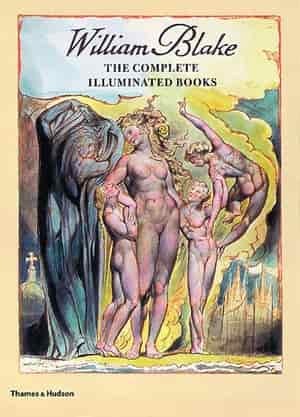Reading Blake, I always get the sense he’s working in a fever, trying to translate an ecstatic vision for us mortals. I saw someone call him the original troll—that too, the radical printmaker in the time when printmaking was a real threat to the established order. Blake harnessed its power, provoking the church and state with his unorthodox satire.
My favorite work of his is probably easy to guess: A Marriage of Heaven and Hell.
At the chaotic end of the 18th century, William Blake, radical, takes aim at Swedenborg, theologian, for his treatise on the afterlife. He scorns Swedenborg’s theology, claiming it full of “all the old falsehoods.” In fact, Blake takes offense at his lack of creativity as much as his stolid ideas: dividing heaven from hell, soul from body, angels from devils, sinners from saints.
In Blake’s cosmology, there’s no division, just one whole. He flips the script, giving “the Devil” a voice that sounds awfully sensible. ‘Heaven’ is the staid authority, certainty, order; ‘Hell,’ therefore, according to Blake, is the necessary energy of humanity. Passion, chaos, creativity, emotion, desire. You can’t call one good and one evil, he contends, without an irrevocable loss. “Without contraries there is no progression.” In his fervent vision, we ARE the divine, soul and body together, good and evil together, culminating in his epiphany: “for every thing that lives is Holy.”
At around 15 pages, this work somehow feels like a magnum opus. What Blake calls his “Proverbs of Hell” are frank and energetic: “The road of excess leads to the palace of wisdom.” “What is now proved was once only imagin’d.” His art fills the page, clotting the margins with childlike intensity. It’s provocative and irreverent, disconcerting and droll, ingenious and moving.
To be fair, C.S. Lewis comes for Blake in turn, undoing his great marriage in The Great Divorce. But arguably, Blake has outlasted Swedenborg. Arguably, he’ll outlast Lewis too. Life has a way of overturning the certainties. And thus Blake resonates, at least with me, in a way his rivals don’t. The contradictions are necessary. We could do worse than to listen, embrace the energy and the passion, the chaos and the doubt.
